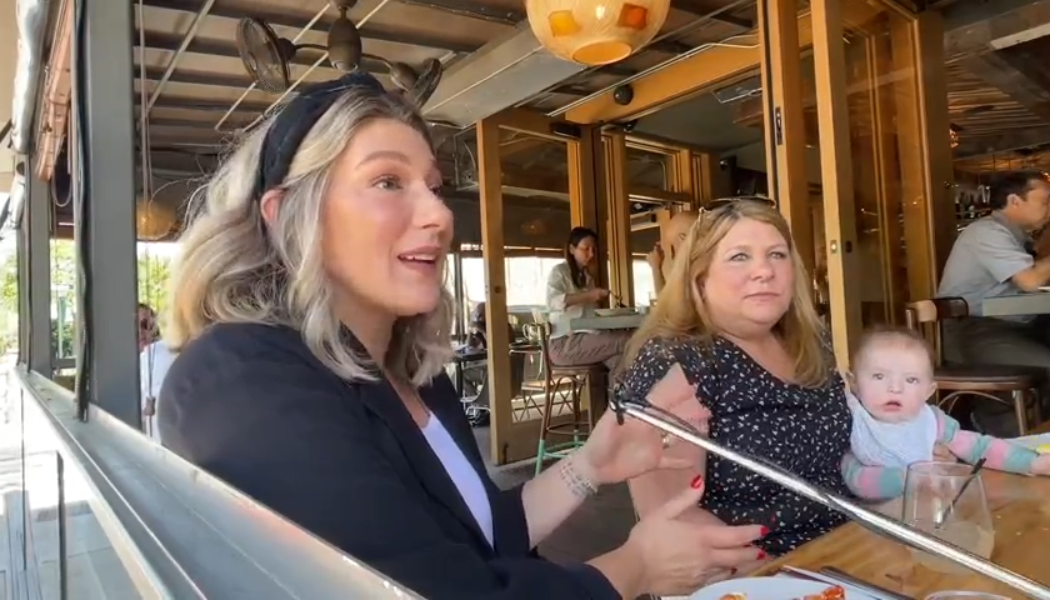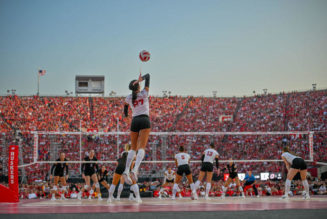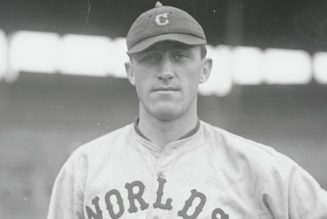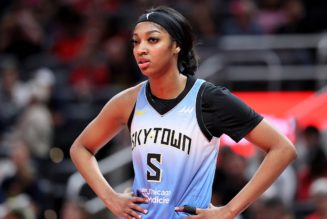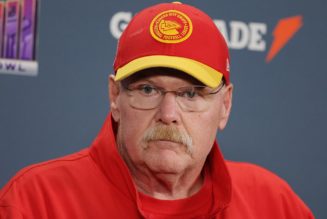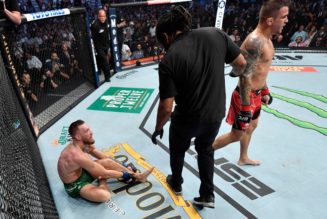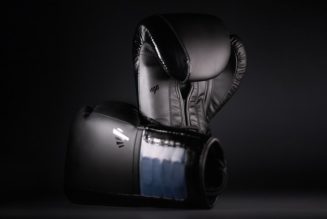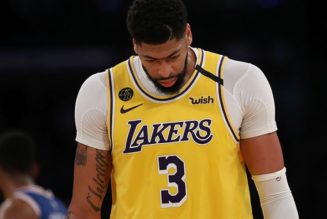In the time since Jennifer Hammond became a full-time sports reporter for WJBK-Channel 2 in 1997, she has covered every major sporting event in Metro Detroit and is a prominent fixture on the Detroit Lions beat.
More importantly, she’s also a mother to a daughter, Sydney, and son, Reilly, now both in college.
It hasn’t been easy juggling motherhood and a career that involves working nights, weekends and travel, but the 58-year-old Hammond, affectionately called “The Hammer” by fans and colleagues, has been able to enjoy being a mom and raising two kids while having the career she dreamed about as a kid.
Here’s a conversation with Hammond as part of a Mother’s Day story, along with Channel 4 sports reporter Jamie Edmonds and Channel 7’s Jeanna Trotman, that appeared in The Detroit News:
Question: How do you parent and work?
A: Well, when my kids were younger, it was about balancing my time, not being there for bedtime, for tuck-in, for dinner, missing some of their things in the afternoon at school. But, the converse of that is that I have Wednesday and Thursday off, so I could go participate more in their lives when they were young. I found my way around it, but it wasn’t without its challenges.
Question: You work during the week and nights and weekends. How have you balanced all of it?
A: For sure, the toughest thing I think for women is that, I don’t feel like I was ever able to compartmentalize my life — in that when I went to work, I just completely focused in on work and forgot about my kids and that when I was home with my kids, I completely forgot about work and focused on my kids. I think men can compartmentalize better. Even now, still, my son has challenges at school, and when that’s happening — I was in tears on the way to work (the other day), and I’m 58 years old, and he’s 22 — but I literally had 15 minutes on I-75 to get my act together, wipe away my tears, and knew I had to go to work and that I couldn’t have excuses and I couldn’t be whiny about it because everybody’s got (stuff).
Question: You’ve got two kids in college, and you’re technically an empty-nester. How is that?
A: Being an empty-nester has been nice, because I can stay at work longer and don’t have to worry that there’s someone at home waiting for me to cook dinner or that needs me to pick them up. There’s a lot of freedom to it.
Question: Do you feel like your kids, in a sense, became more independent because of their mom’s career?
A: Yes. I think sometimes our greatest weakness becomes our greatest strength. They had to learn to fend for themselves, and I think that they like it that way. That’s not to say that we don’t have family dinners and things. It also, perhaps, shows them what it takes to build a career, because I don’t just have a job. I’ve built a career over 35 years, and I paid my dues.
The other thing that I will say: early on when I started my career, it felt more like there wasn’t the talk about mental health and work-life balance and allowing parents to parent and mothers to take their mothering roles seriously. Whereas nowadays, there’s so many more companies doing things to help working moms and working families and working fathers getting paternity leave and things of that nature. Back in the ’90s and early 2000s, that wasn’t really the way of the world. I felt it was harder. Not to disparage what Jeanna (Trotman) and Jamie (Edmonds) are going through, because it’s still emotions, it’s still a child, it’s still work, but I feel like there’s so much more consideration now given to moms with newborns and new babies. They create these nursing rooms.
Every company has to have a place where you can go and privately pump (breastmilk). I remember that (former WJBK reporter) Lucy Noland and I were two of the first moms that were trying to pump at work, and we had to use a makeshift green room, and it wasn’t always private; there wasn’t a sink and there wasn’t what we needed. There were just very different circumstances surrounding that. I had to go on a road trip once to an MIS race when I was a pumping mother, and I can remember waking up, and I was sharing a house on Devil’s Lake with a photographer and a producer, and I was nursing Syd. I had to literally like find a place where I could pump and dump. I just don’t think that that would happen anymore in this world.
Question: Do you ever pinch yourself when you think about your career? You were working in Chicago and came to Detroit in ‘94 to talk to (then-station manager) Lorna Gladstone, who was starting WDFN, a sports-talk radio station. Is it correct to say you called her on a whim?
A: It was a whim in that I was home for the weekend to see my mom. I was working in Chicago and my agent in Chicago had told me about DFN going on the air, but never got me the face-to-face with Lorna Gladstone, because Lorna thought I was from Chicago. She didn’t realize I had been in Detroit. So, when I was home visiting my mom one weekend, I was like, “How is it that she wanted to talk to me and now she doesn’t want to talk to me?” She was all interested in me, and then she wasn’t, and I just wanted to find out on my own what didn’t my agent represent about me that made her think I wasn’t deserving of at least an interview.
And that’s when I called Lorna and said, “Hey, I’m in town. I’m home visiting my mom for the weekend and just wondering if I could come down and see you.” And Lorna said, “What do you mean you’re home?” I said, “I’m from Detroit. I grew up in Birmingham.” And that’s when she said, “Can you be here in an hour?” And she hired me on the spot. That had to be June of ’94. She hired me on the spot, so I promptly fired my agent, and I have not had one since.
Question: You could have just believed your agent and never made that call.
A: There was just something that told me that (the situation) didn’t feel right. I so badly wanted to do sports, and to answer your original question, yes, I do pinch myself still. On days when I’m starting to feel like, ‘I’m so tired. I don’t want to wake up early to go do that,’ then I think of when I was in seventh or eighth grade, and I wanted to be Phyllis George (who, in 1975, was hired as co-host of The NFL Today on CBS Sports, becoming one of the first women to cover sports on a national network). And here I am. I’m literally living my dream. I had one dream in my life for my career, and I’ve achieved it.
Question: And you’re still doing it.
A: And still l doing it. That’s what I’m most proud of, because a lot of women don’t want to share their age. I’m proud to say my age, because I feel like it’s a medal of honor. It’s my achievement. It’s my experience. It’s also, I think there’s a lot of things that I can feel and sense, and it’s made me a different storyteller.
Question: You’ve got the wisdom of experience and the wisdom from being a mother. Do you think you tell stories and observe with maybe different sensitivities than — I’m not trying to compare you to men in the business …
A: Absolutely. Yes. I will compare myself to men. A whole different compassion, and not to say that men aren’t compassionate, but as a mother, when I see a 22-year-old boy, really a kid … it was Michigan State basketball, and they lost, and it was really hard on (Tyson) Walker, and I could just really sense it. He kind of clapped back at one of my questions, and a younger me would have been like, “What an entitled athlete,” but then I stepped back and I finished the interview, waited till everyone cleared his area, and I went over to him, and I just kind of leaned my hand on his shoulder and — I don’t even remember the question I had asked, but basically, it left it open for him to turn to me and say, “We lost,” and I was looking for more than that — but I told him, “You know what? I could have asked a better question.”
A 30-, or maybe even a 45-year-old me never would have gone back and said, “I could have asked a better question; that’s on me.” And I thought to myself, “These kids are my son’s age.” I can’t imagine strangers coming to my son and saying, “Why did you do that? What happened when you did that?” So, it’s definitely changed how I view the world. So many of these kids are my son’s age, my daughter’s age, and it’s incredible to conceive that.
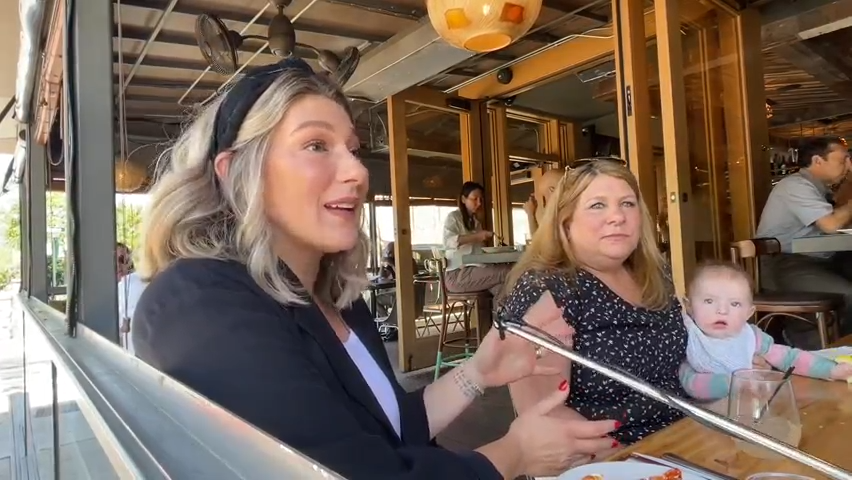
Detroit female sports reporters talk about juggling life and work
Navigating careers and motherhood: Metro Detroit female sportscasters talk about balancing their personal and professional lives.
David Guralnick, The Detroit News
Question: It is interesting to have that perspective in this business. Do you ever wonder how the athletes look at you?
A: No, but I do make a point of saying to a lot of the young kids that I first meet on the beat, I like to say, “I covered Kirk Gibson when he was a player. I covered Barry Sanders,” and they’ll be like, “Wow, you’ve seen a lot.”
And even (Lions GM) Brad Holmes said that to me one time. He was asking me about myself, which was very rare, and he said, “Wow, you’ve seen a lot around here, haven’t you? You know how the fans are. You know how it is.” I said, “Absolutely, I do.” And plus, I just feel like the older you get, I understand that it’s entertainment. I just don’t live and die with it. We’re so lucky. We live in a great sports town.
Question: I think what you have is perspective.
A: Perspective is exactly the word. In a business where so many people lose their perspective, it’s really nice to find it and have it.
Question: It seems you have a healthy respect for the job you do and for the athletes you cover and you understand the ups and downs of it. Is it ever hard not to take it for granted?
A: I don’t think I’ve ever taken it for granted. Doesn’t mean there aren’t days when I’d rather stay in bed and pull the covers over my head, but I’ve never taken it for granted. And I appreciate every photographer that I go out with that busts their ass and carries the cameras and helps me look good.
Question: This is a different world in the media business these days. Are you glad to still be part of navigating all the new layers?
A: Yes, and I’ve gone from homogenized to almond milk, that I can transition with it and not feel like I’m a techno idiot. Like just taking this drone observer class (that I started recently), I felt empowered to learn a new trade. And I think I’m pretty good on social media, and I’ve still got great skills with modern changes in technology in the field.
Question: And you find yourself still able to interact with the younger athlete?
A: I had a very interesting conversation with (Tigers outfield) Riley Greene (recently) and we were talking about binge-watching. I could still relate maybe because I’m still a kid at heart and because I do have kids his age. And I will say cool, full-circle kind of moment — I’m almost gonna cry telling you this — (recently my daughter) Sydney, babysat for Jamie (Edmonds’) baby. My 19-year-old daughter was babysitting her six-month-old. Jamie has been a really dear friend of mine ever since she got to town. We were buds, and we’re still buds, and it doesn’t feel to me like Jamie is a generation removed from me. I learn as much from her as she learns from me, I feel.
achengelis@detroitnews.com
Twitter: @chengelis
